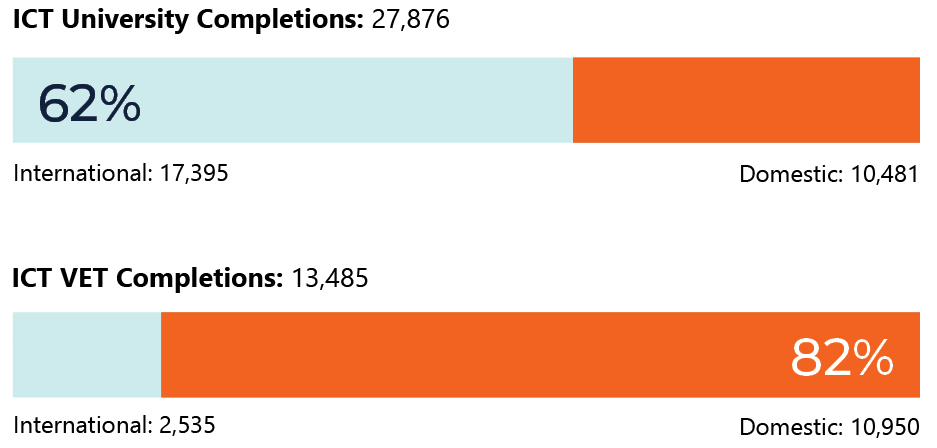University graduates alone won’t fill the capability gap
The APS will need to broaden education pathways to fill digital skills gaps.
The APS has long relied on graduate programs to source digital talent, primarily targeting university graduates with bachelor’s degrees or higher. With 74% of new digital and ICT hires holding a bachelor’s degree or above, this approach heavily shapes the talent pool.1
To close the growing digital skills gap over the next five years, the APS will need to broaden its recruitment strategy and tap into more diverse education pathways. The talent pool of degree-qualified candidates is shallow and fiercely competitive: only 38% of course completions come from domestic students,2 and international graduates are ineligible for APS roles unless they hold citizenship. Meanwhile, just 14% of new APS digital and ICT hires hold VET-level qualifications.3
This represents an opportunity to develop more strategic partnerships with the sector, ensuring the APS can leverage offerings to build the capability required by the service.
Figure 1: Education as a supply capability

-
Figure 1: Data table
The Opportunity
VET pathways offer flexible, practical upskilling and can boost workforce diversity through lower entry barriers and shorter study times. Although many employers say graduates need extra training to be job-ready,4 the APS could benefit from strategic partnerships with VET providers to align training with specific capability requirements.
Micro-credentials are rapid, targeted skill development courses and are increasingly offered by tertiary education providers. Micro-credentials can help the APS quickly build, upskill or reskill its digital workforce to meet evolving needs.
-
Questions for agency consideration:
-
Exploring whole-of-APS opportunities:
Case Study 1: NSW 20% Alternative Pathways Pledge
- Australian Public Service Commission, APS Employment Database custom request RFI 2086, June 2024
- Department of Education, Awards Course Completion Pivot Table 2023; NCVER, Total VET students and courses, 2023
- Australian Public Service Commission, APS Employment Database custom request RFI 2086, June 2024
- Australian Information Industry Association, Digital State of the Nation 2024: AIIA Member Survey, July 2024